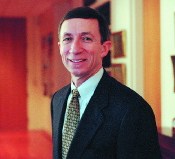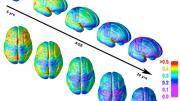"The university is very healthy as a whole. The immensely successful Rudenstine presidency has placed us in an excellent position to face some radical challenges in the next few decades. From what I've seen of President Summers's initiatives and momentum, I have a feeling that all of the faculties will be involved in an era of real changeand opportunityand that the Harvard of 30 years from now is going to be a lot stronger and probably a lot different. The only thing that could persuade me to become a dean, late in my career when I have a couple of unfinished books that I'd like to be working on, is my belief that this will be an era when Harvard is in one of its periods of renewal and re-creation. It's an honor to be a small part of that."
 |
| Thoroughgoing Harvardian William A. Graham changes course for Divinity Ave. |
| Photograph by Stephanie Mitchell / Harvard News Office |
So says William A. Graham, who became dean of Harvard Divinity School in August, after serving as interim dean since last January. Now 58, he has had plenty of opportunity to study up on Harvard. He earned a Ph.D. in comparative history of religion and Islamic studies from the Faculty of Arts and Sciences (FAS) in 1973, and has since risen through its professorial ranks to become Albertson professor of Middle Eastern studies and professor of the history of religion.
Last spring, as interim dean, Graham went with his faculty on a retreat. Subsequently, he organized them into three task forces, which began in September to evaluate all of the school's degree programs, except for the doctoral program, which is administered jointly with FAS. These include the three-year master of divinity program, which has about 150 students, most of whom are in training as Christian ministers. The largest program, with 200 students, is a two-year course of study leading to the master of theological studies degree, which may be pursued for a wide variety of reasonsby a potential academic as a run-up to the doctoral program, by a journalist wishing to study ethics. The third task force is reviewing the one-year master of theology program.
"It's possible that a program could be abandoned," says Graham, "or completely revised and changed in length and content. Almost everything is on the table in these discussions, and I expect them to be quite lively. But what I think I saw last springand one of the things that encouraged me to...reorient my own plans for the next five years or morewas a real willingness of the faculty to rethink what we're doing here."
Harvard has unusual strength in world religions, "a strength that most divinity schools, with the exception of Chicago, probably can't match," says Graham. "Perhaps we should build on that strength." Yet others wonder what the place of non-Christian religions should be within an ostensibly Christian divinity school.
Graham comes to his new job, and the puzzlements that face the school, with the tools of a strong scholar and an experienced academic leader. A student of the history of religion and a comparativist, he is author of an influential work on the oral uses of written texts in Hinduism, Christianity, and Islam, Beyond the Written Word: Oral Aspects of Scripture in the History of Religion. He speaks Arabic, French, and German fluently, and gets along with a dictionary in Greek, Latin, Dutch, Italian, Turkish, Persian, Sanskrit, and Pali (a Buddhist scriptural language). He speaks with strong geniality in English, with the slight Southern accent of a native North Carolinian. (He did his undergraduate work at the University of North Carolina at Chapel Hill.)
Graham has taught a wide variety of courses over the years, many of them cross-listed at the Divinity School. Because of his new responsibilities, he has had to cancel two of them this year, an Arabic reading course and a Core offering that had more than 300 students the last time out: "To Far Places: Literature of Journey and Quest." He will teach in the doctoral seminar for second-year students in religion in the spring, and he will retain his office in FAS's Barker Center for the Humanities.
The new dean has worn numerous administrative hats, including director of the Harvard Center for Middle Eastern Studies and chair of the Department of Near Eastern Languages and Civilizations. Since 1991 he has also been master of Currier House; his wife, co-master Barbara Graham, is associate director of the Harvard University Library for administration and programs. Their son, Powell, 14, is a freshman at Roxbury Latin.
The Grahams expect to decide by Christmastime whether to stay on at Currier after this academic year. The Divinity School has been without a permanent dean for the past four years, and faculty and students express some sentiment that a sense of stability would be encouraged should the Grahams take up residence in the deanery on Francis Avenue, close by the school. (Graham's predecessor in the office, although at his request he was not called "dean," was Father J. Bryan Hehir, a diocesan priest whom all knew was on loan and could at any time be assigned elsewhere. He now heads Catholic Charities USA in Virginia [see "A Divinity Activist," November-December 2001, page 76].)
Graham may be the first person without ministerial training to lead the school. He is a church-going Protestant whose religious beliefs do not match up exactly with any denomination. "Study of other religions introduces a certain degree of relativism in one's own self-understanding of what faith is about," he says. "I don't see one tradition having a monopoly on truth. I'm enough of an historian to feel that religious communities and theologies are humanly conditioned efforts to apprehend whatever is beyond our apprehension. To recognize the contingency of the human side of religious faith still leaves open all sorts of possibilities on the transcendent side, things that we're not given to know and can only speculate about in the end, or judge from our own experience ultimately.
"I have some difficulty with organized religion in general," Graham adds. "Organizations tend to get wrapped up in themselves, rather than in their object and purpose. It's a problem for every institution."
Graham hopes to lead his faculty to reconsider the school's complex mission, to recruit new colleagues, to overhaul the curriculum as need be. How will he fare in a school described by some observers as strangled by organized dogmas?
Three years ago, List professor of Jewish studies Jon D. Levenson '71, Ph.D. '75, was quoted in these pages (see "The 30 Years' War," September-October 1999, page 57) as saying, "In the old days, one was required to believe certain theological dogmas: the incarnation of God in Jesus, the Resurrection, and so on. Now the school requires that one subscribe to radical feminism, to inclusive language, to their views on homosexuality and affirmative action....Political correctness is the new orthodoxy."
"I am not sympathetic to dogma of any kind," says Graham. "The great privilege and therefore responsibilitythat we in the university have is precisely the readiness to listen to every point of view and not disparage it. We may refute it, and be as vehement as we have to be, as long as we are doing that on the playing field of ideas.
"Debate will always be heated in the area of religion," he believes. "People will feel their faith challenged by challenges to particular ideas. The key thing is respect for one's interlocutors. That makes it possible for people to clash with each other without it becoming an irrational matter of conformity to dogma.
"One of the sad facts of history is that those who have been oppressed tend to become oppressors. We see it around the world all the time [and] in the intellectual world as well. But in my brief time at the Divinity School," says Graham, "I haven't seen the emergence of orthodoxies that anyone is demanding people conform to. The potential is there in several different areas, no question. But I like to think that both students and faculty in the end will opt for rational debate rather than oppression of any particular viewpoint."
Professorial turnover at the school "is possibly going to be not massive, but notable, in the next five to 10 years because of the age of the faculty," says Graham. "We have a heavily tenured faculty, and that means we need a lot of new blood."
He cites three outstanding faculty appointments in the past yearin American Christian history, in Buddhist studies, in Meso-American and Latino-Christian studiesand hopes to add seven or eight junior and senior people in the next two years. "That will immediately change the demographics of a faculty of just under 40 people," he notes.
Certain obvious fields must be covered by new hires, but Graham subscribes to the "Red Auerbach system of selection," a reference to the man who put together some superb basketball teams for the Boston Celtics. "We don't worry so much about the positions they play. We want really outstanding individuals, and if we insist upon hiring only outstanding faculty, we'll be all right.
"The last big surge that this school experienced, in the late 1950s and '60s, happened," says Graham, "because a variety of young scholars came to the school at the same time and built the strongest New Testament department probably in the world and strong theology studies. There followed a period when, arguably, this was the place where everybody wanted to come. I think that's possible again."





